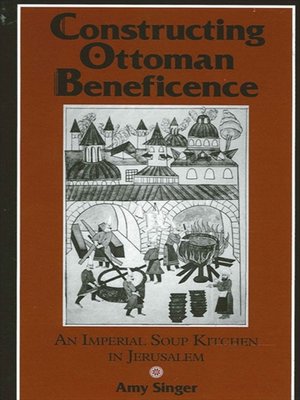Constructing Ottoman Beneficence
ebook ∣ An Imperial Soup Kitchen in Jerusalem · SUNY Series in Near Eastern Studies
By Amy Singer

Sign up to save your library
With an OverDrive account, you can save your favorite libraries for at-a-glance information about availability. Find out more about OverDrive accounts.
Find this title in Libby, the library reading app by OverDrive.



Search for a digital library with this title
Title found at these libraries:
| Library Name | Distance |
|---|---|
| Loading... |
Presents the political, social, and cultural context behind Ottoman charity.
Ottoman charitable endowments (waqf) constituted an enduring monument to imperial beneficence and were important instruments of policy. One type of endowment, the public soup kitchen (imaret) served travelers, scholars, pious mystics, and local indigents alike. Constructing Ottoman Beneficence examines the political, social, and cultural context for founding these public kitchens. It challenges long-held notions about the nature of endowments and explores for the first time how Ottoman modes of beneficence provide an important paradigm for understanding universal questions about the nature of charitable giving.
A typical and well-documented example was the imaret of Hasseki Hurrem Sultan, wife of Sultan Süleyman I, in Jerusalem. The imaret operated at the confluence of imperial endowment practices and Ottoman food supply policies, while also exemplifying the role of imperial women as benefactors. Through its operations, the imaret linked imperial Ottoman and local Palestinian interests, integrating urban and rural economies.







